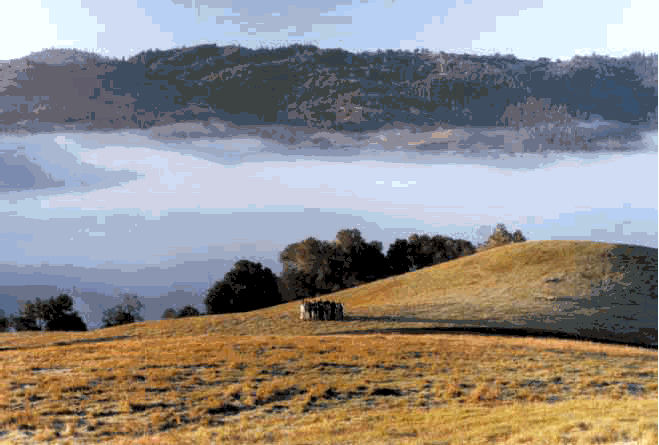
40 Years in America

|
|
40 Years in America |
|
The International Re-Education Foundation

The International Ideal City Project property in Mendocino County, California. The farm later became known simply as "Boonville."
The San Francisco-based International Re-Education Foundation led by Sang Ik "Papasan" Choi tapped most directly into the communal ethos and utopian idealism of the 1960s. Adapting the Principle message to secular, non-theistic audiences, Mr. Choi consciously adopted a "character-educational" rather than a "church-theological" method. This created misunderstandings within the Unification movement, particularly with Miss Kimís Unified Family, but was effective in appealing to disaffected young people. Between 1966-71, Mr. Choi fashioned a highly successful communitarian experiment which included active witnessing, multiple centers, student groups, weekend workshops, a "New Age Band" which performed at regular public meetings, the International Ideal City Project on 600 acres of land in Mendocino County, the International Pioneer Academy in San Francisco, and International Friendship Banquets with as many as 500 guests and speeches by dignitaries such as San Francisco Mayor Joseph Alioto. Although, as with most communitarian experiments, the International Re-Education Foundation was not to enter the promised land of utopian fulfillment, it did provide a way of "actualizing" the Principle that continued to be influential, particularly in the San Francisco Bay Area.
Mr. Choi had several advantages over the previous Unification missionaries. Whereas Miss Young Oon Kim and Mr. David S.C. Kim had come alone to the U.S. and Col. Bo Hi Pak arrived only with his family, Mr. Choi came on the foundation of a victorious mission in Japan. Between 1958-64, he successfully planted the church in Japan after several previous missionaries had failed. Thus, he could draw on tested methods. He also drew on a small but elite corps of Japanese church missionaries, all members for several years, all dedicated, and all successful, who joined him in San Francisco. Still, given the cultural barriers, the work was slow. In this respect, the testimony of the first American to join the group was revealing,
I was in a tee-shirt, part way stretched out on a beach, looking at the sun and wondering how I got there. Koro showed me an address and said, "You come!" I came and immediately found myself in the world of oriental custom and tradition. I liked the people, and when Koro asked me, I moved in....
Although struggles continued, the original community of eight doubled its membership with new American members by the end of 1967. A pattern of doubling membership each year continued until 1971. The transition of Mr. Choiís group, initially known as the "Japanese Family," into the Re-Education Center and finally the International Re-Education Foundation occurred in several stages. The initial stage followed Mr. Choiís assessment of the liberal San Francisco Bay Area and decision to reconfigure his group as a "Re-Education Center" rather than as a church. The educational format afforded new American members the opportunity to help shape and direct organizational activities in a more dynamic way than in the other missionary groups. A second stage followed the publication of Mr. Choiís Principles of Education (c. 1969). Unlike the other missionariesí texts, which purported to be pure translations of the Principle as lectured in Korea, Mr. Choiís work was a conscious adaptation. As he expressed it, "Based on the Divine Principle, I put my philosophical ideas and a little bit of oriental religion together and I a little bit changed the Divine Principle." Basically, the series was a humanistic counterpart to the Principle, positing the attainability of an ideal world through application of the communityís overriding concept of "conscientious common sense." Although Mr. Choi devised a system of educational principles that presumably would lead to "divine" principles, what was critical for the communityís development was the way in which the Principles of Education assumed a life of their own. More than any other factor, the Principles of Education led the community into a final utopian stage which followed the founding of the International Ideal City located on 600 acres of land just south of Boonville in Mendocino County, which would "prove" their social theories. Plans were made for various sectors to represent the unique architectural styles of the world, and "Articles of Establishment" were drawn up which included sections on politics, economy, education, culture, law, and "qualifications for citizenship." They fully expected it to be a model for others to study. Or as Mr. Choi put it, "If we can establish the ideal city system, we can win the whole world."
The Re-Education Center members fell immeasurably short of winning the world. However, they did succeed in transforming themselves. The group no longer thought of itself as local but international. Hence, the founding of the International Ideal City in Mendocino County was answered by the founding of the International Re-Education Foundation (IRF) in San Francisco. The purchase of an imposing new headquarters building at 44 Page Street, San Francisco in June 1971 led the community into two more ambitious projects. The International Pioneer Academy officially opened on September 20, 1971 with an entering class of thirty, twenty of whom were members, eight professors and a full curriculum. With ballroom and balcony, Page Street headquarters also was well suited for a succession of "International Friendship Banquets" which led to a culminating Christmas banquet for 1,200 guests at the Kabuki Theatre on December 18, 1971. As members gathered on the stage of the Kabuki and looked out over the audience of prominent San Franciscans and world delegates, they had little reason to suspect that the following years would see the dismantling of almost everything Mr. Choi had built up.
Download entire page and pages related to it in ZIP format
Table of Contents
Information
Tparents Home